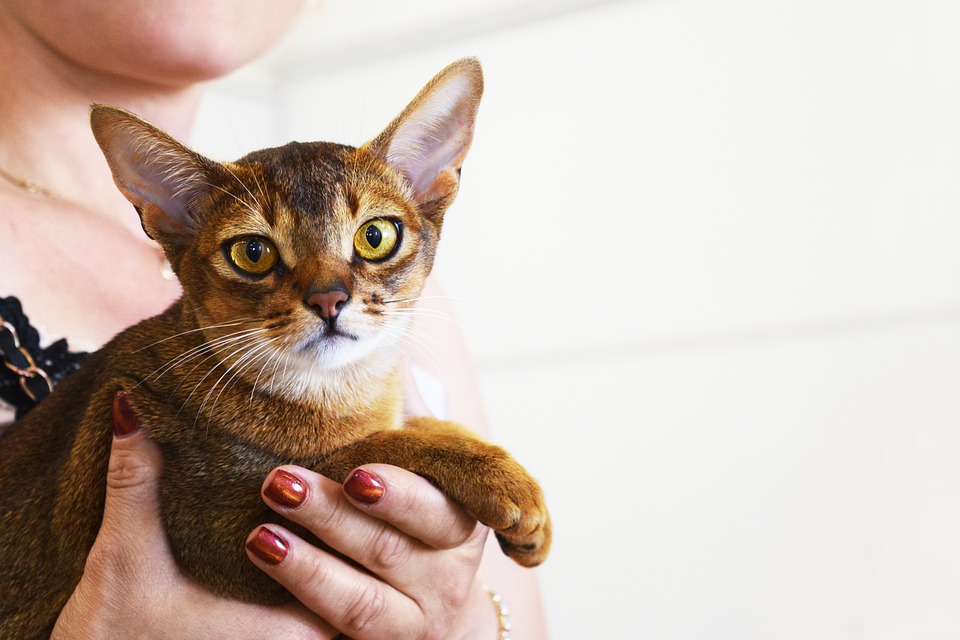Table of Contents
Are Abyssinian cats friendly? Yes they are!The Abyssinian cat is the ‘YOLO’ breed of the cat family. They are the types of cat that would want to make the most out of every moment and seize the day. They have that ‘carpe diem’ attitude! Are Abyssinian cats friendly? Abyssinian cat is generally cheeky and curious. They make a great companion which is why they are one of the most popular cat breed in the U.S. When an Abyssinian cat looks at you, you can see their eyes are quite expressive making them hard to resist! In this article, you’ll learn the answer to your question, are Abyssinian cats friendly?
Are Abyssinian Cats Friendly: Origins
The exact origins of the Abyssinian cat breed are actually unknown! Mysterious indeed, right? However, there are few different theories where this beautiful breed might have come from. Some say they originated from Asia, some say they’re from Africa, while some say they are from Egypt. Their lineage stretches quite far back which is why the exact continent where they came from remains a mystery today.
Are Abyssinian cats friendly? The Abyssinian breed is known for being fond of heights and they just love having fun. Expect to constantly see them on table tops or on top of your furniture! This breed is officially recognized as a breed in Great Britain back in the 1870s. However in the United States, the Abyssinian cat only became known around the 1930s. According to some historians, the origin of their name is thought to refer to the country Abyssinia which is Ethiopia today.
Zula – The First Abyssinian Cat
Zula, the first Abyssinian cat breed, was exhibited in Great Britain. The cat was brought back by British soldiers from the Abyssinian war. Still, other people believe that they are descendants from ancient Egyptian cats. This is because the Abyssinian cats have a similar appearance to the sacred cats that are depicted in ancient Egypt. In fact, the Aby also bear a resemblance to felis libica which is a wildcat that’s also the ancestor of the brown tabby breed. According to recent genetic testing, the pedigree of the breed may have originated around the southern area of the Indian Ocean to South East Asia.
Physical Features
The physical feature of the Abyssinian breed is that they are a short – haired cat and is a medium – size breed. On average they weigh around 8 to 12 pounds. Males are quite larger than females. They have that elegant and regal looking. They also have a lean and muscular body structure. Abyssinian cats sport a wedge – shaped face with big almond – shaped eyes that is gold, hazel or green in color. They possess large and pointed ears that are upright and alert.
Abyssinian cats have slender legs with oval paws. They can stand high on their toes, which is why you might see them as if they are tiptoeing. They also possess a long tail that’s thick at the base and has a tapering tip. Are Abyssinian cats friendly? Yes they are and even if they have that sort of a wild look in them, they are truly a great companion!
Coats and Colors
Abyssinian cats sport a ticked coat pattern. This means that each strand of their hair has alternating bands of light and dark colors. The coat of aby cats are short and dense. It’s also soft and silky when touched. Thanks to its fine texture. In the United States, there are four acceptable coat colors for the Abyssinian cat breed.
The first one is Ruddy which is also known as burnt – sienna color. This coat is an orange – brown color with ticking bands in black and dark brown. The second one is red; which is a cinnamon color that has ticking bands of apricot and chocolate brown. The third one is blue; which is a rosy beige color that has ticking bands of steel and light cocoa. And the last one is fawn; a dusty cream color with ticking bands of pale cream and lilac fawn.
Temperament and Personality of Abyssinian Cats!
Are Abyssinian cats friendly? These cats have great personality. From the onset, they are outgoing creatures and a very clever breed. Do not underestimate their ability to be creative especially when it comes to sneaking out! Generally, they are docile pets who love to interact with people and explore the world around them. They love to play and fool around. Playing is actually their favorite pastime. The best part? You can also teach them a couple of tricks! Make sure to cat – proof your house because they are the kind of breed that will explore every nook on your house!
Are Abyssinian cats friendly? These cats are affectionate but they are not your typical lap cats. As mentioned earlier, they love adventure. You’ll always find them following you around and watching what you’re up to. They like to be the center of attention which is why it’s best that you give that to them. That said, if you’re not at home for most of the day, make sure that they have other feline company because they don’t like to be alone. They are so friendly that it’s easy for them to get along with other animals and people.
All cats instinctively like to be up in a high place. It just gives them that sense of security against potential threats. Plus it’s their natural instinct to pounce on a potential prey. What’s cool about Abyssinian cats is that they can gracefully leap from one place to another. They are acrobats which is why it’s best that you provide them with a cat tree otherwise your furniture will become their cat tree.
Life Expectancy and Health Issues
Are Abyssinian cats friendly? Yes they are and you can expect them to live around 12 to 15 years. And just like any other pets, they too are susceptible to health issues. Here are some health issues to watch out for:
- Renal Problems: This is usually an inherited disease that affects the kidneys of your cat
- Pattelar Luxation: Another hereditary condition that involves dislocation of kneecaps.
- Pyruvate Kinase Deficiency: A hereditary condition that involves a lack of pyruvate kinase which is an enzyme that’s needed for metabolism. Symptoms may include jaundice, lethargy, and enlarged abdomen.
- Hyperesthesia Syndrome: It’s a neurological disorder where cats tend to groom themselves in an excessive manner that they lose their hair. They could make them twitchy and agitated at times.
- Progressive Retinal Atrophy: This is an eye disease condition.






 Author and long-time animal lover. Sharing knowledge on pet care through experience and the written word.
Author and long-time animal lover. Sharing knowledge on pet care through experience and the written word.